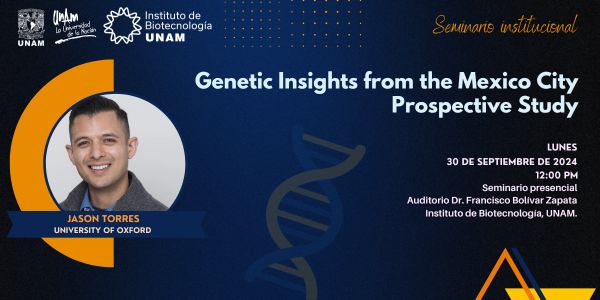
30Sep - 2024
Genetic Insights from the Mexico City Prospective Study
12:00 PM - 02:00 PM|Dr. Jason Torres|University of Oxford|Invitado por: Dra. Aimée Bastidas
Seminario
Abstract: Non-European ancestries remain largely underrepresented in genomic studies, and the disparity undermines genetic discovery efforts. To bridge this gap, we performed genome-wide genotyping and exome sequencing on over 140,000 participants from the Mexico City Prospective Study (MCPS) – the largest blood-based prospective study in Latin America.
In this lecture, I will discuss how we leveraged these datasets to profile genetic variation in two districts in Mexico City, uncover genetic relationships present in the cohort, and infer patterns of genetic ancestry among participants - including Mesoamerican Indigenous ancestry. Moreover, I will present insights into the genetic basis of obesity, diabetes, and smoking behaviour that have been revealed through the study of common and rare variants present in this admixed Mexican cohort.
Bio: Dr. Jason Torres is the genetic epidemiologist lead for the Mexico City Prospective Study. He completed his PhD at the University of Chicago where he investigated the genetic basis of type 2 diabetes (T2D) under the supervision of Prof. Nancy Cox. As a post-doc at the Wellcome Centre for Human Genetics, Jason elucidated regulatory mechanisms at fine-mapped diabetes risk loci by integrating molecular epigenomes in human pancreatic islet cells. In 2020, Jason joined Oxford Population Health (OxPop) where he leads genetic analysis of cardiometabolic traits as part of the MCPS Study Group.
Actualizado 2024-09-24 14:30:42
04-Agosto-2025 al 04-Agosto-2025
09:30 AM
Dr. Eduardo Matos Moctezuma.
09:30 AM
Dr. Eduardo Matos Moctezuma.
Las excavaciones del Templo Mayor de Tenochtitlan.
Ponencia inaugural del Simposio de Verano 2025.
Auditorio Dr. Francisco G. Bolívar Zapata.



